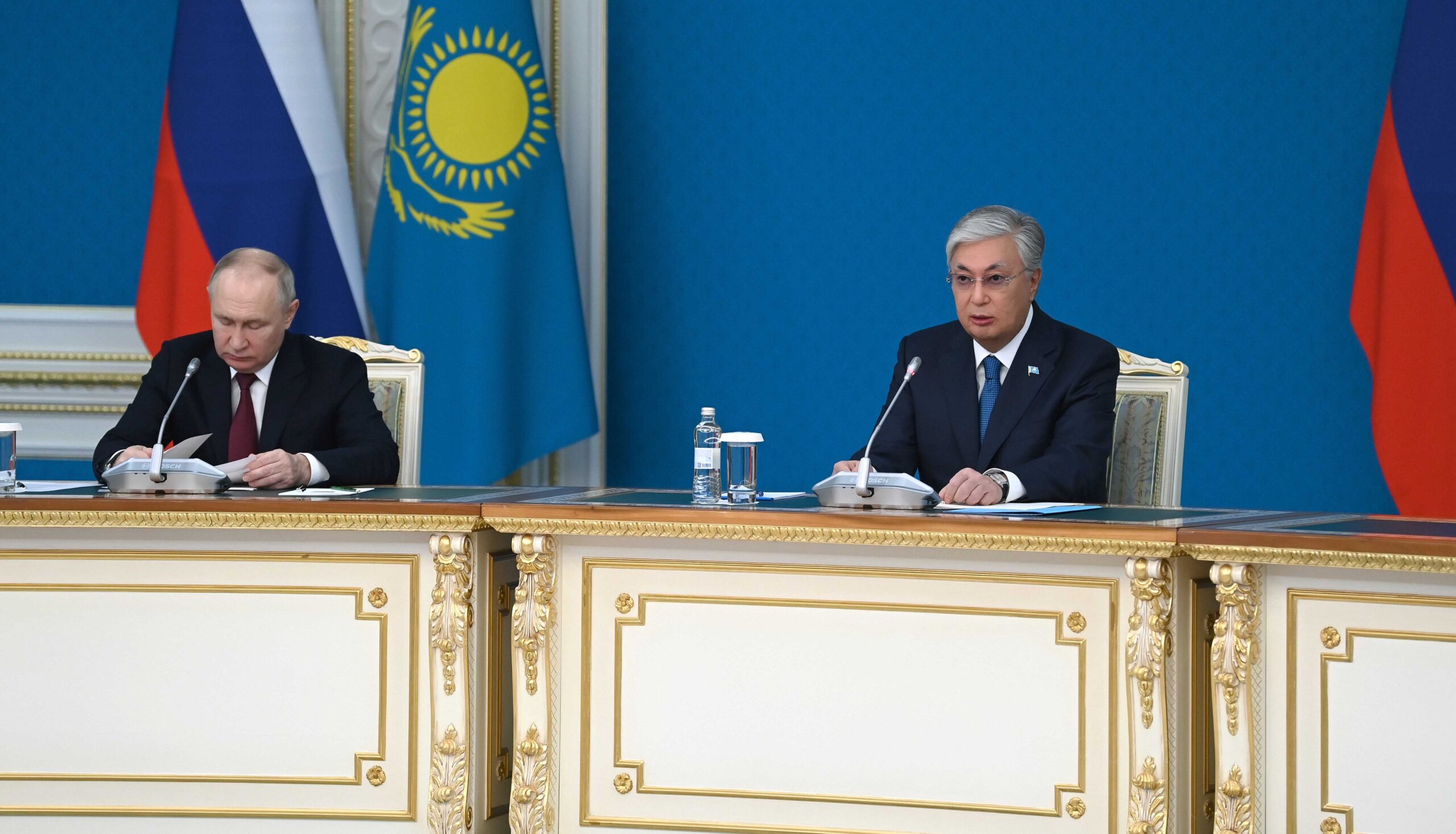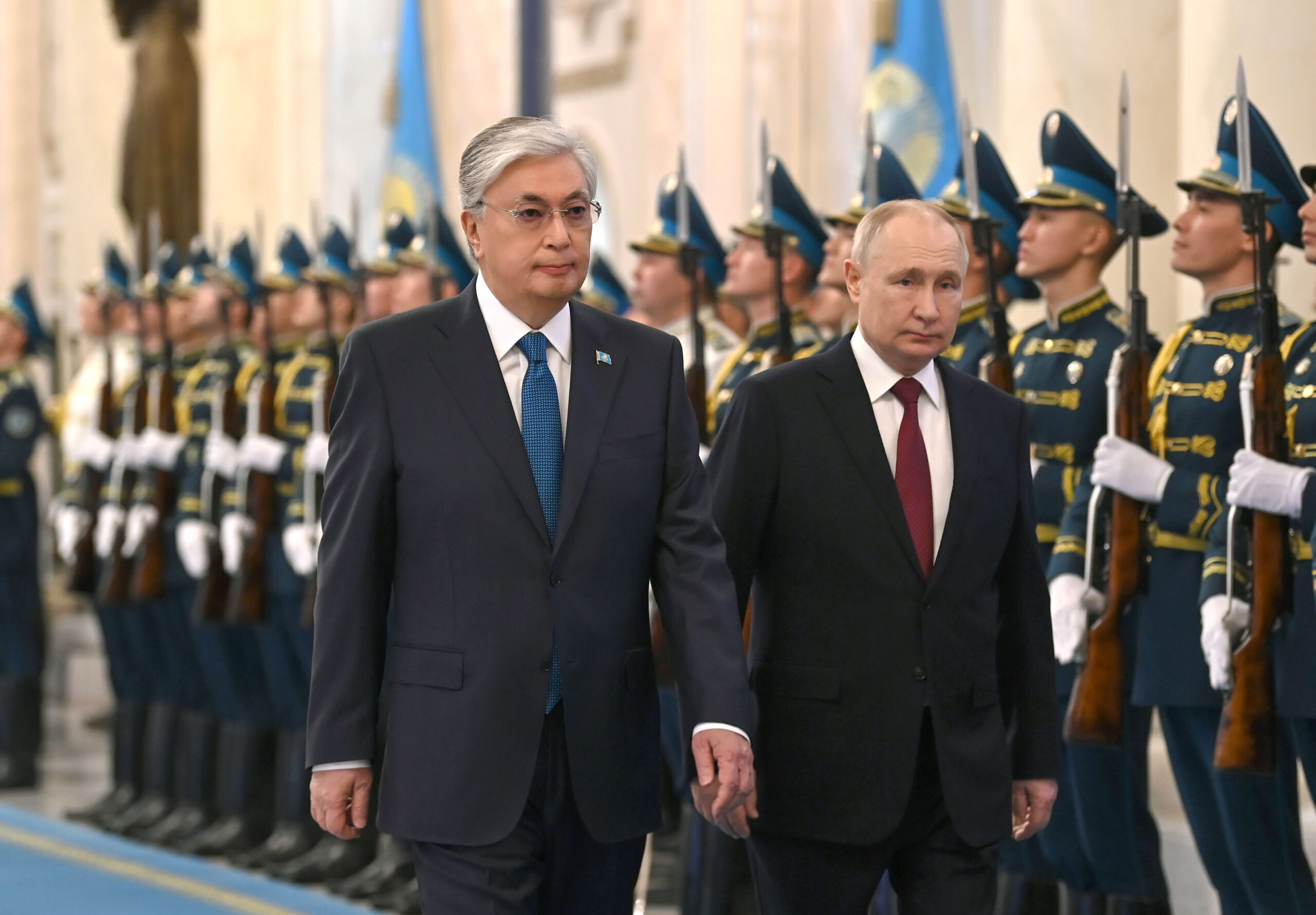ASTANA – Kazakh-Russian partnership prioritizes the development of new logistics directions through Central Asia and the capacity enhancement of existing routes to China, President Kassym-Jomart Tokayev said at a plenary session of the 19th Interregional Cooperation Forum, which took place on Nov. 9 in Kostanay, reported the Akorda press service.

Kassym-Jomart Tokayev and Vladimir Putin deliver their remarks at the 19th Interregional Cooperation Forum via videoconference. Photo credit: Akorda.
Via video address to forum participants, Tokayev announced plans to modernize the Caspian ports of Kuryk and Aktau and build over 1,300 kilometers of railways in Kazakhstan within three years, mentioning the ongoing construction of second tracks on the Dostyk-Moiynty railway section.
The President noted that promising markets of China, India, and the Middle East, along with the growing importance of the North-South transport corridor, necessitate the development of storage infrastructure, including grain elevators and fruit storage facilities.
Kazakhstan plans to increase climate-controlled product storage capacity by one million tons, considering that losses of domestically produced agricultural goods reach 40% due to deficiencies in logistics and storage systems in Kazakhstan and Russia.

Kassym-Jomart Tokayev and Vladimir Putin. Photo credit: Akorda.
According to Tokayev, bilateral trade turnover between the countries hit a record high of $27 billion, with direct investments from Russia exceeding $20 billion.
As the largest producers of agricultural goods, Kazakhstan and Russia enter the top ten world leaders in grain exports, accounting for almost 10% of arable land and 9% of pastures and hayfields globally.
The volume of gross agricultural output has more than doubled in Kazakhstan over the past five years, alongside agricultural exports approaching $6 billion.
In the next five years, Kazakhstan plans to implement nearly 900 investment projects in the agricultural sector totaling 2.7 trillion tenge ($5.7 billion), Tokayev said.
Russian President Vladimir Putin said countertrade grew by another 7% in January-August this year, noting the expanding use of national currencies in export-import transactions.
Tokayev spoke about increasing the share of processed products in the agricultural sector to 70% within three years.
“We should not compete with each other in the internal market of the Eurasian Economic Union. We need to jointly look for ways to increase the availability of fertilizers for our farmers and enter foreign markets,” Tokayev said.
Tokayev announced plans to modernize the water sector, including the ongoing implementation of a joint roadmap for intensifying cooperation with Russia to conduct research in the basins of the large Ural and Irtysh rivers.
Tokayev highlighted the importance of developing modern agricultural science and actively introducing innovations in the agro-industrial sector. He emphasized that Kazakhstan will soon reorient state support measures in the mechanical engineering sector to small-unit assembly and related industries.
President Tokayev necessitated coordinating efforts to ensure the food security of the two countries in the face of unprecedented global challenges.
During the narrow-format talks, Tokayev called Putin’s visit to Astana a remarkable event, as it coincided with the 10th anniversary of the Treaty on Good Neighborliness and Alliance in the 21st Century, signed on Nov.11, 2013.
“Russia is the undisputed leader in the number of enterprises with foreign capital in Kazakhstan, with 20,000 companies operating in the country,” Tokayev said.
Tokayev pointed out the energy sector, where collaboration was brought to a new level with the agreements on the transit of Russian oil to China and gas to Uzbekistan through Kazakhstan’s territory.
Putin appreciated the successful development of allied relations between both countries, underscoring the importance of the forum in bolstering cooperation in such an important area as food.
President Tokayev expressed confidence that a solid package of agreements and business contracts signed at the forum will unlock the significant potential of the countries’ economies.
Nine interregional and commercial agreements worth $83 million have been signed so far on building a plant to produce shelf-stable bakery products, manufacturing lifting equipment, and equipment for industrial milk cooling. Cooperation agreements were also signed between the Atameken National Chamber of Entrepreneurs and the Russian Chamber of Commerce, alongside a contract on using and cultivating forest planting material.

